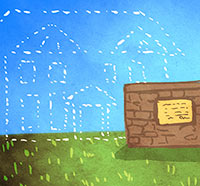COMMENT OF THE DAY: HISTORY IS IN THE EYE OF THE DEEDHOLDER  “Demolish your great aunt’s soup tureen! Every person wants to preserve her or his family history, yet is bonkers to bulldoze the neighbor’s. BS. All of it is Houston’s history — whether, or not, George Washington or George Bush slept there.” [movocelot, commenting on Texas May Demolish Your Local Preservation Laws] Illustration of demolished historic structure: Lulu
“Demolish your great aunt’s soup tureen! Every person wants to preserve her or his family history, yet is bonkers to bulldoze the neighbor’s. BS. All of it is Houston’s history — whether, or not, George Washington or George Bush slept there.” [movocelot, commenting on Texas May Demolish Your Local Preservation Laws] Illustration of demolished historic structure: Lulu





This headline deserves nomination as the “Comment of the Day”!
If one of the Georges (or let’s say a King George to round things out a little) happened to have been responsible for the destruction of some place — notable or otherwise, regarded as new or old at that particular moment in time — is that not an event deserving the adjective: “historical”? Why must history be construed to reflect the addition to some facet of our tangible world, and never a subtraction from it?
.
In making a work of art, does a sculptor not subtract from his monolith? Does a painter not cover some of his background with his own foreground? Does a barber not cut hair, despite it (usually) growing back? In making a wood frame structure (or even to maintain one!), is a tree not cut down in its prime? To make steel, is ore not strip mined; are not entire mountains made to disappear? Are these not subtractions from our tangible world? Is that not permissible? Is it to be condemned? For that matter, are the subtractions in one sense not also compliant with the Law of Conservation of Mass? Is a repository of construction waste not historic simply because it lacks gingerbread affectations? If cemeteries can be historic then why not a dump?
.
As a society, I think that we must acknowledge that the physical manifestation of our civilization is an ongoing work in progress. We should not mortgage our future to honor the past in this way.
.
More to the point…it is certainly possible to place a covenant on one’s real property precluding the possibility of demolition by future owners. If you or your more immediate forebears sell it to a third party without such a covenant (which is certainly understandable if one desires to protect the value of their progeny’s inheritance), does that *historical* event not reflect the character of your ancestors, their efficacy as parents, their genetic legacy, and/or their circumstances? Is the manner of subtraction of a tangible ancestral legacy not a reflection upon that legacy? Does the inheritance not enable the progeny to thrive and celebrate life?
.
I can think of several good justifications to oppose the state law which is being proposed. In particular, it really ought to provide more specific guidelines. It ought to acknowledge the value of historic districts, and that the value of the whole intact area is greater than the value of the sum of its parts, and then provide uniform guidelines for the creation of such districts. If local control is the problem, and I concur that there is reason for concern, then assert state control. However, any appeal to family history rings empty to my ears.
How about letting people do what they want with their own stuff? Doesn’t seem like a difficult concept